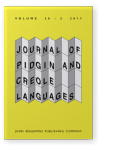Vol. 26:2 (2011) ► pp.276–340
Decreolization as emergent grammar(s)
Some Afro-Bolivian data
A restructured variety of Spanish spoken by small communities of Afro-descendents in Bolivia differs from modern Spanish in exhibiting no noun-adjective agreement for gender or number. Only a few individuals continue to speak this most basilectal variety; the majority of speakers exhibit at least some gender and number concord, in a fashion that proceeds generally rightward, from determiners and other prenominal modifiers to head nouns, postnominal modifiers, and predicate nominatives/adjectives. Number concord (plural marking) usually appears before gender concord in mesolectal varieties, and occurs at a higher rate than gender concord across the entire range of Afro-Bolivian speakers. A variationist analysis based on a corpus of recorded material suggests that this gradual emergence of (feminine) gender and plural marking represents a systematic form of decreolization governed largely by structural principles, namely the stepwise activation of agreement projections. Decreolization is represented as a series of nested intermediate grammars, each of which properly contains the preceding one(s).
Cited by (5)
Cited by 5 other publications
This list is based on CrossRef data as of 5 july 2024. Please note that it may not be complete. Sources presented here have been supplied by the respective publishers. Any errors therein should be reported to them.
